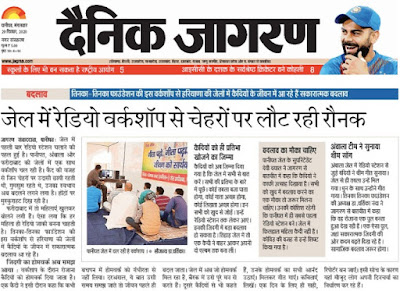This is Tinka Jail Radio: Jails in
Haryana to get their own radio
· Jails of Ambala, Panipat and Faridabad to
start jail radio
· 5 inmates from Panipat, 6 from Ambala
and 10 from Faridabad were chosen radio
presentation skill training
· Trained by prison reformer Dr. Vartika
Nanda.
· One hour long daily programs on current
affairs, jail news and songs
New Year has bought some good news for
the jails in Haryana. For the first time, these jails will have their own jail
radio which has been named as “Tinka Jail Radio”. Haryana has a total of 19
jails, out of which 3 are central jails whereas 16 are district jails. For the
time being, jails in Haryana have a total of 20,423 inmates out of which more
than 900 are females. Jail radio in the state is set to be started in the
Central Jail, Ambala, District Jail, Panipat and District Jail, Faridabad. Auditions
were held in the month of December after which 21 inmates from 3 jails were selected
for the jail radio. (5 inmates from Panipat jail, 6 inmates from Ambala Jail
and 10 inmates from Faridabad jail). These include 5 female inmates from
Faridabad jail Inmates were trained by Dr. Vartika Nanda, prison reformer and
the Head of Department of Journalism in Lady Shri Ram College, Delhi
University.
Selected inmates of these 3 jails were
a part of 5 day radio training programme. These inmates are from different age
groups and educational backgrounds. The purpose of the training was to prepare inmates
to make radio programs along with making them understand about the needs and
importance of jail radio.
The closing ceremony of the training
programme was held at District Jail, Faridabad with the valedictory address by the
Director General of Haryana Prisons Shri K. Selvaraj. Inmates were given
feedback and also the certificate.
Radio station will be set up in the
jail premises and will be broadcast though speakers set up outside the
barracks. People from outside will not be able to connect with this station. It
will have programming on legal issues, disease prevention, in-house talent and
music. Inmates will also be able to submit requests or questions which will be
answered in the next program.
According to Vartika Nanda, “Jails have
already starting witnessing a change in prison atmosphere Inmates are busy
polishing their talent, they are using the radio lingo and addressing each
other as RJs. inmates will be both producers and the consumers. We are making a
special model of Tinka Model of Prison Reforms which will be shared with other
prisons across the country. Tinka Tinka is working towards becoming a bridge
between prisons.”
A list of artists in the jail is being
prepared which will decide their participation in the jail radio. Inmates from
these 3 prisons have prepared their own intro song and tune. Inmates are
searching for new opportunities using the limited resources in prison and are
acting as counsellors for each other.
Jail radio was introduced for the first
time in 2013 in the Tihar Prison. Dr. Nanda was present during that time to
witness this event. Tinka Tinka launched jail radio on 31 July, 2019 in
District Jail Agra, which remains as the oldest prison building in India. At
the start of this jail radio, 2 inmates- Uday and Tuhina- were trained as RJs. Later,
another inmate Rajat Sanjay took charge of the radio. Agra Jail Radio
established a female inmate as a radio jockey for the first time.
In the second phase of Tinka Tinka
Prison Model, all jails in Haryana will have their own jail radio. The radio
name of each jail will be connected to its location like Tinka Jail Radio
Ambala, Tinka Jail Radio Faridabad and Tinka Jail Radio Panipat. These inmates have
been prepared in such a manner that has probably never been done in any other
jail in India.


1 comment:
This is a great initiative by Tinka Tinka. Workshops to train inmates and to develop their talents and creativity is an excellent thing to do. The work of Dr. Vartika Nanda, the founder of the movement of prison reforms in India, is a testament to the idea that rehabilitation and not punishment is the answer. The radio will also keep the inmates informed about their rights and will give them respite in these challenging times of the pandemic when the inmates cannot have any visitors.
Post a Comment